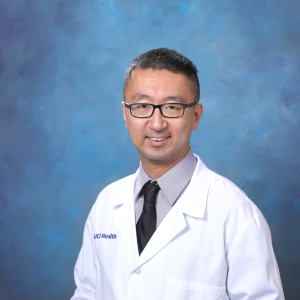The Blood Banking/Transfusion Medicine Fellowship is a one-year fellowship training program accredited by the Accreditation Council for Graduate Medical Education (ACGME). The program provides comprehensive training in all aspects of transfusion medicine, including blood donor and peripheral blood stem cell collection, immunohematology, transfusion practices, therapeutic apheresis, hemostasis/coagulation, tissue banking and stem cell processing. The program prepares fellows for a career in either a hospital transfusion service or blood center setting, to successfully pass the American Board of Pathology Blood Banking/Transfusion Medicine subspecialty examination and to become more effective educators.
Fellows will be immersed in the demands of a modern transfusion medicine service at an academic medical center with a Level I Trauma program, a busy obstetrics and maternal-fetal medicine program, a hematopoietic stem cell transplant program and a pancreas-kidney transplant program. Trainees will participate in all aspects of quality improvement and accreditation-related tasks (FDA, AABB, CAP).
Upon successful completion of the program, trainees will be able to function as medical directors in blood banking and transfusion medicine, in both academic or non-academic institutions. This includes evaluating clinical cases and problems in immunohematology and serving as a consultant to attending physicians within the scope of transfusion medicine.
The Department of Pathology and Laboratory Medicine accepts one Blood Banking/Transfusion Medicine fellow per year. UC Irvine Graduate Medical Education establishes PGY levels for new fellows based on the successful completion of all prerequisite training required for entry into your fellowship program.
Please submit application and letters electronically (PDFs) to Ellie Hunt, fellowship coordinator, at hunte2@hs.uci.edu. For inquiries about the 2026-27 academic year, please email hunte2@hs.uci.edu.
To be eligible for the fellowship, applicants must have:
- Completed a four-year AP/CP residency or a three-year CP residency
- Board-certified or board-eligible in CP or AP/CP, Hematology or Anesthesiology by the fellowship start date. Board eligibility or certification in another clinical specialty or subspecialty will be considered on a case-by-case basis.
- A California medical license
- U.S. citizenship or have fulfilled residency or visa requirements before starting the fellowship. We honor J-1 visas but not H1-B visas.
Your application should include the following:
- UCI CAP standardized application with supplemental form
- Current curriculum vitae
- Three letters of recommendation
- Personal statement
- Dean’s letter (MSPE)
- Medical school diploma with English translation
- USMLE scores (Step 1, Step 2CK and Step 2CS, Step 3) or COMLEX scores (Level 1, Level 2-CE and Level 2-PE, Level 3)
- ECFMG (if applicable)
- Previous ACGME training certificates (if applicable)
Interview Process
Interviews are arranged by email invitation after a thorough review of completed applications. Interviews will occur between August and September. We do not participate in the Unified Approach.
Interviews for July 2026 positions will occur as applicants apply. We'll continue to accept and interview applicants throughout the year, until filled.
Interviews for July 2027 to June 2028 positions will occur between August 2025 and September 2025.

The goal of the Blood Bank/Transfusion Medicine Fellowship is to provide the physician-in-training with practical knowledge of laboratory methods, clinical applications and therapeutic options related to transfusion medicine. This training is designed to give the fellow a foundation in the skills necessary to direct a hospital transfusion service, collection center, apheresis service and cellular therapy laboratory.
Fellows will be able to provide patient care that is patient- and family-centered, compassionate, equitable, appropriate, and effective for treating health problems and promoting health.
Fellows will demonstrate competence in and the ability to provide appropriate and effective consultation in the context of blood banking/transfusion medicine services, including:
- Blood ordering, blood product indications and transfusion practices;
- Cellular therapy;
- Consultation with patients and/or families on specific donation or transfusion issues;
- Coordinating quality and safety for donors and patients;
- Donor notification, lookback and component retrieval;
- Accreditation, regulatory issues and requirements;
- Donor and therapeutic apheresis;
- Educating and assuring the community and potential blood donors of the safety of blood supply;
- Immunohematology, histocompatibility and infectious disease testing in donor management, blood component preparation and blood inventory management;
- Perinatal, pediatric, transplantation, massive transfusion and trauma patient care;
- Management and direction of a transfusion service and blood center, including quality management;
- Management of patients with special transfusion requirements, such as alloimmunization, hemoglobinopathies, and single or multiple coagulation factor deficiencies;
- Peri-operative blood management; and,
- Recruitment of donors
Fellows must be able to perform all medical, diagnostic and surgical procedures considered essential for the area of practice.
Fellows will demonstrate competence in the management and supervision of essential procedures, including:
- Blood management;
- Collecting blood components, including donor apheresis;
- Histocompatibility testing;
- Managing adverse effects of blood donation;
- Managing adverse effects of blood transfusion;
- Preparing blood components;
- Selecting and using specific apheresis technologies to ensure appropriate care, clinical management, and safety of patients and donors undergoing apheresis medicine therapies or blood product collection procedures;
- Testing blood components;
- Therapeutic phlebotomy; and
- Transfusing blood components.
Fellows will participate in performing patient and laboratory procedures and will be expected to supervise ancillary staff members.
Fellows must demonstrate expertise in their knowledge of:
- Advanced diagnostic and therapeutic techniques as they become available;
- Adverse effects of blood donation;
- Adverse effects of blood transfusion, including transfusion-transmitted diseases and non- infectious hazards of transfusion;
- Alternatives to blood transfusion;
- Coagulation (hemostasis/thrombosis);
- Ethical issues;
- Red blood cell, platelet and neutrophil immunology;
- Scientific bases of transfusion;
- Selection and recruitment of blood donors; and
- Transplantation, including hematopoietic, solid organ and tissue.
Fellows will demonstrate an awareness of and responsiveness to the larger context and system of health care, including the structural and social determinants of health, as well as the ability to call effectively on other resources to provide optimal health care.
Fellows will demonstrate the ability to investigate and evaluate their care of patients, to appraise and assimilate scientific evidence, and to continuously improve patient care based on constant self-evaluation and lifelong learning.
Fellows will demonstrate a commitment to professionalism and an adherence to ethical principles.
Fellows will demonstrate interpersonal and communication skills that result in the effective exchange of information and collaboration with patients, their families and health professionals.
The goals and objectives for each of the fellow rotations are based on the above competency areas. While each rotation has some specific goals and objectives, there are a large number of competencies that are COMMON TO ALL rotations. These are listed below.
Upon completion, the Blood Bank/Transfusion Medicine fellow will be able to:
- Discuss the theory and relate the clinical application of all tests and procedures performed in the Blood Bank Laboratory, Apheresis Service and Cellular Therapy Laboratory.
- Provide expert consultative service to clinicians, including but not limited to: interpretation of test results, selection of blood components, and transfusion therapy for both adult and pediatric patient populations.
- Evaluate and classify adverse reactions to blood transfusions and cellular therapy product infusions.
- Review and determine the appropriate use of un-cross matched blood and massive transfusion protocols.
- Relate the theory and applications of therapeutic apheresis.
- Compare and contrast allogeneic and autologous blood donation processes.
- Increase clinical experience through interactions with patients and clinical staff.
- Gain administrative experience by interacting with the Medical Directors of the clinical laboratories, blood services and apheresis departments.
- Understand activities related to process and quality improvement, including root cause analysis, analysis of data entered in occurrence management systems, and development of corrective and preventive actions.
- Understand examples of quality metrics and benchmarks related to transfusion medicine patient populations and the provision of transfusion support to these patients.
- Understand the role of the fellow in ensuring the safety and welfare of patients entrusted to their care.
Connect with Us
For questions about our Hematopathology Fellowship program, please contact our fellowship coordinator.



